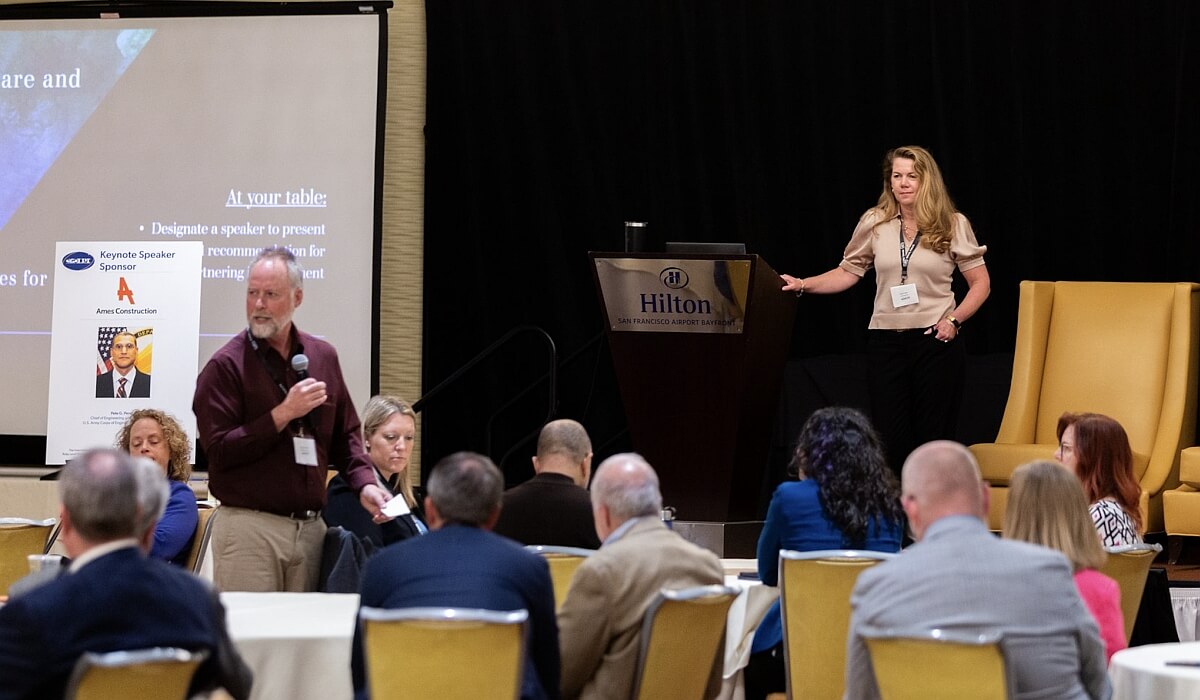If you have been involved in the design and construction industry for even a brief period, you’ve likely witnessed contentious interactions between project stakeholders that far too often result in claims and litigation. Unfortunately, adversarial relationships such as these can lead to exorbitant legal costs for construction projects. They can also cause a great deal of anxiety and stress, quickly turning the vision of your dream project into a nightmare.
The process of construction partnering implemented by a professional partnering facilitator has time and again proven a better way. Through this collaborative approach, the walls of individual companies break down and a united team is formed, productivity and meeting the project’s end-goals reign paramount, and risk fades away.
While some teams have turned to recent project delivery methods, trends, and technology to increase project team collaboration, experience has shown that these tools and processes, while helpful, do not ensure excellence or high team performance.
Alternatively, construction partnering provides a change in mindset that builds trust and true collaboration where everyone on the team is aimed at putting the project first. This methodology does not replace the terms and conditions of the contract but works in tandem with them by helping ensure the expectations of all partners are met.
Successful construction partnering is best implemented with an IPI Certified Partnering Facilitator and a proven track record of building high-performing teams. This relationship-building professional has the tools to unite disparate team members, thus resulting in a significantly higher level of quality on a project while increasing the probability of an on-budget completion and reducing the risk of conflicts and claims. Other benefits of partnering include greater innovation, higher profit potential for all participants, reduction in delays and cost overruns, increased productivity, repeat business and more.
In fact, through a formal partnering approach, even the most challenging projects and teams can become high functioning and can reach this desirable performance level with velocity. This approach can also bring value to teams who work together from one project to the next by creating stronger levels of trust, giving them the ability to reach even greater heights.
Projects of most any size can benefit from the expertise of a partnering facilitator. Whether your project is a $1 million roadway extension, a $50 million office building or a $500 million hospital campus, partnering is scalable and adds value to any project type using any delivery method.
This begs the question, “What is the role of a construction partnering facilitator?”
A construction partnering facilitator provides the process and creates a safe and trusting environment, enabling the project team to focus on their craft so they can deliver exceptional results. They do this by assisting in establishing and maintaining effective partnerships and collaboration among various project stakeholders, including the owner/client, contractors, subcontractors, architects, engineers, and other relevant parties. One of their primary functions is to foster open communication and gain mutual trust and cooperation between project team members.
Complex government projects involving taxpayer funding, strict schedule adherence, tight budgets, various teams and third-party stakeholders have long relied on construction partnering principals implemented by a partnering facilitator to achieve project success. While construction partnering using a formal partnering agreement and a professional partnering facilitator may be standard practice on public sector projects, private project owners and design and construction teams alike can all reap rewards from this expertise.
Partnering facilitators conduct meetings, workshops, and discussions where the stakeholders can come together to share information, address concerns, and identify potential conflicts. Throughout the project’s lifecycle, the facilitator helps the team maintain effective communication channels and resolve disputes, while creating a positive working relationship among the stakeholders. They also conduct regular partnering surveys to measure and improve teamwork.
Skilled facilitators remain neutral, acting without bias on workshop content while using his or her expertise to create a productive environment that promotes collaboration and problem-solving.
Further, facilitators help the team set and work toward commitments and shared goals by assigning responsibilities and holding each other accountable to achieve results. The facilitator devises a process for measuring and adjusting these shared goals throughout the project if needed, helping to ensure the project stays on track and the updated goals are understood and met.
Due to a variety of circumstances, a goal such as the project timeline may need to be extended, but with partnering techniques that foster communication and eliminate misunderstandings, the team can positively move forward assured that everyone is working toward the best project outcome.
Construction partnering facilitators also possess expertise in conflict resolution, negotiation, communication, and project management. They have further proficiency in establishing Partnering Agreements, which outline the principles, objectives, and commitments of all involved parties.
Ultimately, the aim of a construction partnering facilitator is to enhance project outcomes by reducing conflicts, thus mitigating claims; improving efficiency; fostering teamwork; and maximizing the value delivered to the owner/client. By encouraging collaboration and aligning the interests of all participants, these valued professionals greatly contribute to the successful completion of any construction project, making it a win-win for all project stakeholders.
Contact us to learn more about Velo Group and the advantages our partnering facilitators can bring to your next construction project.
PHOTO: Velo Group’s Eileen Sien facilitating a brainstorming session at the 2023 International Partnering Institute Conference

